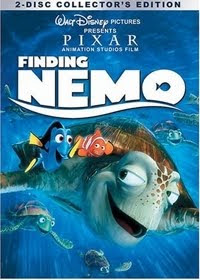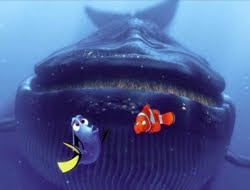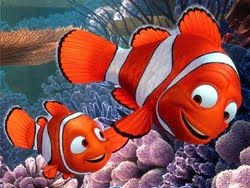 Once again, my students and I satisfied the literature portion of the research course using Joseph Campbell's story rubric as our focus. To evaluate everyone's understanding of the hero cycle, this semester I showed Finding Nemo instead of The Matrix, the tried-and-true film I have used previously. Finding Nemo has several advantages: it is approximately 100 minutes, so even though we broke for discussion at four places in the movie, we still saw the whole thing during two 75-minute class meetings. Second, I didn't have to ride the volume command as there are fewer scenes that will inspire an instructor next door to ask me to reduce the noise—no gun battles, no explosions, no screaming subway trains. Plus, all of those overprotected, closed-minded religious kids can't complain as it is a G-rated movie. The nice thing about a Pixar choice is that there are enough references to adult concerns that the students don't think the movie is totally unhip; Bruce and his shark boys, for example, are in a 12-step program for "substance" abuse.
Once again, my students and I satisfied the literature portion of the research course using Joseph Campbell's story rubric as our focus. To evaluate everyone's understanding of the hero cycle, this semester I showed Finding Nemo instead of The Matrix, the tried-and-true film I have used previously. Finding Nemo has several advantages: it is approximately 100 minutes, so even though we broke for discussion at four places in the movie, we still saw the whole thing during two 75-minute class meetings. Second, I didn't have to ride the volume command as there are fewer scenes that will inspire an instructor next door to ask me to reduce the noise—no gun battles, no explosions, no screaming subway trains. Plus, all of those overprotected, closed-minded religious kids can't complain as it is a G-rated movie. The nice thing about a Pixar choice is that there are enough references to adult concerns that the students don't think the movie is totally unhip; Bruce and his shark boys, for example, are in a 12-step program for "substance" abuse.We managed to get Marlin through 16 of the 17 stages. The only one we missed was "refusal of the return." Since the movie so abbreviated the return portion of the cycle, we concluded that Marlin probably satisfied this stage as well, but the scene didn't make the final edit. When I have time to watch the movie again carefully, I'll follow Nemo more closely and see if he too goes through all seventeen stages.
We broke Departure down like this:
Call to adventure: Nemo disobeys his father and swims past the drop off to inspect the boat. This scene should inspire Marlin to leave the reef and venture into the open water.
Refusal of the call: Marlin attempts to order Nemo back but refuses to follow his son past the drop off.
Supernatural aid: The scuba diver nets Nemo, the goggles with the Sydney address the "amulet" Marlin needs to start his adventure. [Many students wanted to use Dory as supernatural aid, as she guides and advises—such advice as it is—our hero throughout the adventure.]
Crossing of the first threshold: Marlin makes his ineffective dash after the boat carrying his captured son.
Belly of the whale: Marlin finds himself out in the ocean proper, far from the comforts and familiarity of the reef.
 After our discussion of Departure, I turned the movie back on and let them watch through the encounter with the sea turtles. After this portion of the film, we decided that Marlin had three major challenges during his "road of trials," the first stage of Initiation. He learns how to deal with the new denizens of the open ocean when he and Dory encounter Bruce, the great white, and the other shark boys. The anglerfish and then the school of jellyfish teach Marlin about the dangers past the drop off. I challenged the students to find another series of three, but most of them could only pick out one or two more. Since I used the scuba diver as supernatural aid, I believe Marlin's first "trial" is learning to make sense of the illogical Dory. Another one that the students tended to overlook was escaping the tottering ship that almost crushes Marlin and Dory right after they escape the sharks—perhaps because they lumped this scene into the trial of the sharks. The smart-ass school of fish, another communication challenge, made a total of six for me.
After our discussion of Departure, I turned the movie back on and let them watch through the encounter with the sea turtles. After this portion of the film, we decided that Marlin had three major challenges during his "road of trials," the first stage of Initiation. He learns how to deal with the new denizens of the open ocean when he and Dory encounter Bruce, the great white, and the other shark boys. The anglerfish and then the school of jellyfish teach Marlin about the dangers past the drop off. I challenged the students to find another series of three, but most of them could only pick out one or two more. Since I used the scuba diver as supernatural aid, I believe Marlin's first "trial" is learning to make sense of the illogical Dory. Another one that the students tended to overlook was escaping the tottering ship that almost crushes Marlin and Dory right after they escape the sharks—perhaps because they lumped this scene into the trial of the sharks. The smart-ass school of fish, another communication challenge, made a total of six for me."Well, what if you ask us about road of trials on the exam?" asked one student who couldn't come up with six.
"Then you say something like, 'Road of trials is a stage that typically comes in series of three. Marlin faces many trials during his adventure, but the three most important ones are A, B, and C.'" Most of them just don't know how to manipulate the evidence to make it look as if they know more than they actually do, and sometimes I feel like a used car salesman explaining how to spin the material to their advantage.
 We decided that Crush qualified as "meeting with the goddess," the next stage of Initiation, even though he was male. His emphasis on parenting made him, in our minds, feminine, and his advice about giving children independence seemed the key lesson Marlin needed to learn to complete the adventure successfully. I had primed them earlier in the unit for considering a male character as feminine. During the hero cycle lecture, we viewed a clip from Return of the Jedi when Darth Vader and the Emperor try to tempt Luke to the dark side of the Force. I explained that "dark" was symbolically feminine [for example, the black half of the yin-yang [ sign], so Vader and the Emperor, both men, could qualify as "woman as temptress" since they represented the dark [i. e. feminine] side of the Force.
We decided that Crush qualified as "meeting with the goddess," the next stage of Initiation, even though he was male. His emphasis on parenting made him, in our minds, feminine, and his advice about giving children independence seemed the key lesson Marlin needed to learn to complete the adventure successfully. I had primed them earlier in the unit for considering a male character as feminine. During the hero cycle lecture, we viewed a clip from Return of the Jedi when Darth Vader and the Emperor try to tempt Luke to the dark side of the Force. I explained that "dark" was symbolically feminine [for example, the black half of the yin-yang [ sign], so Vader and the Emperor, both men, could qualify as "woman as temptress" since they represented the dark [i. e. feminine] side of the Force. Next, I let them watch through the fishing boat capture. We equated the whale, gender undetermined, that swallows Dory and Marlin as "woman as temptress" because in Marlin's mind at least this experience takes him off the path of his adventure. The whale poses the danger of getting eaten on the one hand, but it is also a womb-like bubble of protection from the other uncertainties of the ocean. One very literal, not-so-bright student interjected that the whale scene was "belly of the whale," even though we had concluded that a different, much earlier part of the movie had already met that stage, even though I had carefully explained the stage as being swallowed into the great unknown. Alas, there's one in every class ...
Next, I let them watch through the fishing boat capture. We equated the whale, gender undetermined, that swallows Dory and Marlin as "woman as temptress" because in Marlin's mind at least this experience takes him off the path of his adventure. The whale poses the danger of getting eaten on the one hand, but it is also a womb-like bubble of protection from the other uncertainties of the ocean. One very literal, not-so-bright student interjected that the whale scene was "belly of the whale," even though we had concluded that a different, much earlier part of the movie had already met that stage, even though I had carefully explained the stage as being swallowed into the great unknown. Alas, there's one in every class ...For Marlin, "atonement with the father" is the most important stage. We concluded that Marlin's "father" was all of the permissive dads who allowed—in Marlin's mind at least—their children to have too much independence. At the start of the movie, Bob [the seahorse], Ted [the octopus], and Bill [the fish] come to mind; they easily relinquish their children to Mr. Ray, the schoolmaster. Marlin initially believes that these fathers are wrong to give their children so much freedom, but as a result of his adventures, he realizes that Crush and Dory are both right about trusting and letting go.
Marlin gets to demonstrate his "atonement with the father" during the next two stages, "apotheosis" and "the ultimate boon." When Dory is scooped up by the fishing boat, Nemo rushes to help her. Marlin, however, doesn't want to lose his son again and tries to interfere. Nemo insists that he can save Dory and explains that Marlin can help as well by getting all of the netted fish to swim down. Marlin relinquishes Nemo's fin, allowing his son to have independence, and then works to inspire the trapped and bewildered catch to swim together toward the ocean floor. Marlin demonstrates god-like ability as the catch overpower the humans who trapped them. Their eventual escape of the net qualifies as "the ultimate boon," the difficult task easily accomplished. I told my students to compare this Marlin to the pathetic version at the beginning of the movie. Pre-adventure, Marlin couldn't save Nemo from a tiny net; now, however, he nearly capsizes an entire fishing boat to free his son.
My students and I never observed Marlin refuse the trip home, but we could get him through the rest of the Return portion of the cycle. We decided that a couple of things could satisfy "magical flight." First, since ocean gossip about Marlin's search for Nemo helped our hero get to his son, then all the creatures who knew the story would help [or at least not hinder] his return to the reef. Since some students believed Dory was supernatural aid, equating her as a loopy Athena to Marlin's dysfunctional Odysseus, Dory could also be the divine aid maneuvering Marlin home. Even the pipe Marlin begins to follow, erected by otherworldly humans, could qualify.
"Rescue from without," that call from the old life to return, has existed the entire movie for Marlin. The reef, its comfort and familiarity, beckons him back. We knew Marlin crossed "the return threshold" because we saw him happily home at the end of the film.
 We realized that the journey had certainly changed Marlin. Not only does he allow Nemo the independence to attend school, but that tight hold he had both on his son and himself [hence his inability to tell a successful joke] has loosened. Now he can deliver a flawless punchline and graciously welcomes Bruce, the fish-eating great white, who arrives to deliver Dory. The other reef dwellers, none of whom have taken as great an adventure, panic in the shark's presence, but Marlin, who is now "master of two worlds"—the reef and the open ocean—has no fear. He has "freedom to live," his worst personality flaw corrected during the arduous journey. Marlin has the knowledge and skill to swim past the drop off if a need ever arises. Should a paralyzed parent be unable to dash after a lost child, we know if Marlin is there, he will swoop up the fishlet and return the kid to the reef in Superman fashion.
We realized that the journey had certainly changed Marlin. Not only does he allow Nemo the independence to attend school, but that tight hold he had both on his son and himself [hence his inability to tell a successful joke] has loosened. Now he can deliver a flawless punchline and graciously welcomes Bruce, the fish-eating great white, who arrives to deliver Dory. The other reef dwellers, none of whom have taken as great an adventure, panic in the shark's presence, but Marlin, who is now "master of two worlds"—the reef and the open ocean—has no fear. He has "freedom to live," his worst personality flaw corrected during the arduous journey. Marlin has the knowledge and skill to swim past the drop off if a need ever arises. Should a paralyzed parent be unable to dash after a lost child, we know if Marlin is there, he will swoop up the fishlet and return the kid to the reef in Superman fashion.I read the Joseph Campbell biography at Wikipedia and learned that several folks criticize his hero cycle. For example, Kurt Vonnegut says that it is better named the "in the hole" theory and can be summarized like this: "The hero gets into trouble. The hero gets out of trouble." A careful reading of The Hero with a Thousand Faces reveals that the cycle is more than "into trouble ... out of trouble." Several key stages in Initiation—"meeting with the goddess," "woman as temptress," and "atonement with the father"—and then demonstrating "master of two worlds" in Return are key to refining the hero's personality, fixing flaws that existed before the adventure began. We tend to believe that we "know it all," but hearing and accepting the advice of the goddess shows us that we don't have the full picture, opening us up to the wisdom of others. Navigating successfully past the temptress, who represents the pleasures and diversions of the flesh, allows us to experience the full strength of our own discipline and will. In "atonement with the father," when we see that we too are capable of what we despised or disagreed with, we realize that any two opposing sides have validity. We see that another's opinion is not a cause to argue, just a different "side" of the one universe, someone's wet to our dry, someone's cold to our hot, someone's salty to our sweet.
The cycle isn't a spring break road trip where the hero parties too much and then returns home unchanged. The cycle is instead an opportunity to evolve, the chance to develop an inner strength that makes the hero more adaptable to an ever-changing world. Neo in The Matrix is better able to maximize his potential as the result of his adventure, just as Marlin demonstrates at the end of Finding Nemo.


